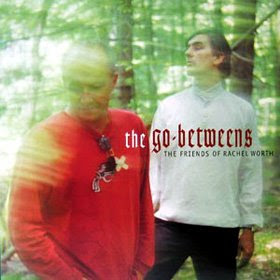I could carve you from memory and then carry you through these hills
Bright Yellow, Bright Orange (2003) ***1/2
These Antipodeans are genetically incapable of remotely approaching producing a less than excellent album. However, they are approaching middle age and as expected growing mellower - much mellower. Reconstituted as a four-piece with an anonymous rhythm section, this is the smoothest and most polished Go-Betweens album so far, which as you might have guessed isn't a particularly good thing: gone forever are any potential rough edges or quirks as Forster/McLennan settle down into their comfy armchairs, kick up their legs on the coffee table, and swap guitars & vocals as they strum away at pleasantly predictable folk-pop tunes - adult contemporary as a mug of hot cocoa. Which is to say that this is the kind of album that 30 or 40something aging hipsters shall delight in whistling along to while they brew a hot cup of tea while perusing through the Sunday papers on a warm weekend morning, while youngsters baffled at where the Go-Betweens' vaunted greatness as opposed to mere goodness would be advised to look elsewhere. All the classic elements are in place, but the combination of professionally lush production and mostly unambitious songwriting equals a surfeit of non-excitement. It's a comfy album. If this album were a household object, it would be a goosefeather pillow. You don't expect wall-shaking excitement from a pillow, do you? You want to snuggle it close to your bosom while sipping a mug of hot cocoa.
There are precisely two of these ten tracks that leap out as classics as worthy as any in the Go-Betweens, both from the pen of Forster. "Caroline and I," opens the album on a glorious note, by far the best song they've released since....ever? The type of song that after you hear it for the first time you've got to hear it at least once more.....and once more, and then once more again, and again. It's about Princess Caroline of Monaco, born in the same calendar year as Forster, and how their generationally conjoined lives did and didn't parallel. The second instance comes later in the middle of the album: "Too Much of One Thing," a dusty acoustic ballad that's so blatantly Dylanesque that it transcends Dylan - lengthy and repetitively hanging on a handful of chords and lyrically hypnotic. And then you get several excellent songs, mostly on side one, which would earn four stars on its ownsome, and several rather ordinary songs, for which side two drags down the record's rating as a whole. Researching the songwriting credits (which I have to do, as I still have trouble distinguishing Bob from Grant), I'm faulting McLennan: his songs are, with the exception of "Poison in the Walls," much too laidback and self-satisfied. Forster hits nearly all the highlights this time out, still penning literate story-tales ("In Her Diary") and sometimes even rocking out mildly ("Make Her Day"). Though to be fair, McLennan's "Old Mexico," is the album's sole other attempt at rocking. Neither are particularly rocking, but in this context a much-needed jolt of electricity.












